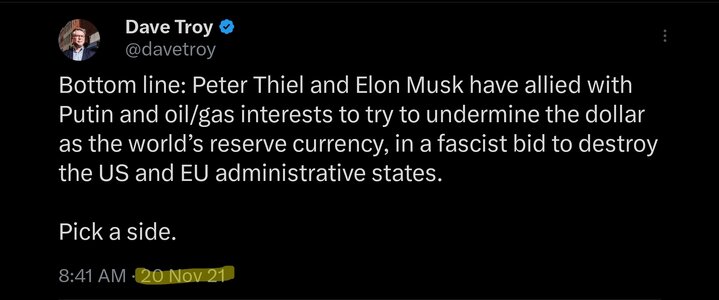You make some good points, and I appreciate you helping talk me off the ledge.
With a Republican House and trump or Vance in the Oval Office, why couldn't Congress just stop printing dollars? They've walked up to the edge with defaulting on our debt several times, which all reasonable people understand would cause a financial meltdown. They don't see a financial meltdown as a deal breaker.
Help me understand why you say crypto isn't a currency - it's used in countless financial transactions every day.
As for different coins, and I'm admittedly showing my ignorance here, couldn't there be a crypto market similar to how currencies are currently traded? And letting the market sort it out is the dream of libertarians like Rand Paul and Thomas Massie. They aren't afraid of serial bankruptcies. There is even a Congressional block chain caucus with 33 members including at least 3 Democrats.
I agree that this falls into the "world falls apart" category, but some of the advocates think that's a feature and not a bug, too. That's why my hair is on fire trying to learn more about this. I need people smarter than me (that's one reason I'm here in the ZZL) to help me understand. I appreciate you taking the time to share your views and knowledge.
1. Credit cards are also used in financial transactions every day. Way more of them, in fact. That's to say that credit cards are an important payment method. Right now, crypto is a payment method, though not an important one. The volume of payments even in newer, smaller systems like venmo or zelle are way higher.
A currency is something different -- usually the term implies some sort of favorable legal status. For our purposes, it will be enough to contemplate the easiest and most important status: you can pay your taxes with it, and only with it. Obviously that status goes to the dollar, and unless that changes, what's the incentive for people to use crypto for any transaction? A business accept BTC from customers in exchange for goods. Now the business has to convert at least some of that BTC to dollars to pay its taxes. I suppose it could pay its workers in BTC, but they would just have to sell a bunch of it to pay their taxes. The business could pay its suppliers . . . and, well, you get the point. Using BTC just multiplies the conversion problem. Since it offers no real advantages over the dollar, why use it?
2. Could the US say that it will accept taxes in BTC? Sure, I suppose. But that in itself would not lead to widespread BTC usage, because banks are very unlikely to make any sort of switch. Let's even assume take away the idea that the dollar is the world's reserve currency, and replace it with an assumption that the dollar is like any other major currency, like Euro or Yen. Still, it would be suicidal for any bank to go crypto.
Banks spend a lot of resources matching their assets and liabilities, and their revenues with their costs. Matching here means "having similar form." For instance, suppose a bank takes deposits in dollars but extends loans in yen. It now has a substantial currency risk, because if the value of the yen falls, the bank's income will plummet, and so will the value of its assets (the loans it has issued), but the liabilities and costs are unchanged. This is a major cause of bank failures, and of financial crises. In the 1990s, for instance, East Asian countries were going broke because their banks had borrowed in dollars and extended credit in their local currencies, so when the dollar increased in value relative to those local currencies, the banks failed; the countries that tried to prop up their banks ran out of money, etc.
In addition, banks also match the interest rate sensitivity of their assets and liabilities. For instance, most mortgages are 30 year fixed term. The interest rate is locked in place at the time the loan is funded. Meanwhile, banks pay interest to their depositors based on the short-term interest rate (or if they have no depositors, to their bond holders or creditors). So if interest rates go up, the banks' income remains unaffected, but their costs go way up. This is how the Silicon Valley bank failed recently. It didn't happen for most banks because they hedged themselves. Of course it was the Silicon Valley bank that decided hedging was for suckers. Line goes up, right?
Anyway, banks accomplish this matching with the use of derivatives. One major form of derivative is the so-called plain vanilla swap, which is an agreement between two entities to pay each other the difference between a fixed long-term rate and the floating, short-term rate. For instance, as mentioned above, the natural business of banks gives it an income stream that is based on fixed rates, and a cost stream based on short-term floating. Well, there are businesses with the opposite profile: they sell on credit (often to large businesses) and the terms of the credit are typically short-term. So they want to exchange short-term revenue streams (i.e. interest on that credit) to match their long-term costs (e.g. the issuance of 10 year bonds). That's a natural pairing, and they execute a swap: when rates go up, the businesses pay to the banks; when rates go down, the banks pay to the businesses. The end result is that both the banks and the businesses are now protected against interest rate changes. They have hedged that.
There are all sorts of complex instruments for this type of hedging -- by which I mean the reduction in risk associated with some sort of event in the world. [Note: People hedge in their personal lives, and probably should do it more. Do you have a long commute? Buy oil company stocks. When the price of oil goes up, your gas costs more, but that's OK because your oil stock is worth more. If oil goes down, your asset is in the drink but you're paying nothing for gas]. Even with a deep, liquid market for these derivatives, and a well-known price history, and formulas for valuing those assets that have been tuned over the years, hedges sometimes fail.
No bank in its right mind will toss all that hedging technology out the window by adopting crypto as its main currency. It would have no idea what those hedges were worth, kind of like how the banks had no real idea of the actual value of the subprime-related "assets" they were holding back in 2007-08. A lot of those banks failed, and so would a lot of crypto-banks.
3. What if the government really wanted to get rid of the dollar, for whatever reason? We still would not adopt crypto as a currency, because one of the most important properties of a currency is stability in value. Currencies appreciate and depreciate frequently, but usually those changes are gradual and determined by economic forces. When currencies sharply change in value, that's a sign that things have gone wrong. And this makes sense, right? Economies function well when most people do not have to be economic prognosticators. When you go to the store to buy a TV, you don't think, "well, I want to buy this, but the dollar is an all-time low and when it recovers, the interest payments will be crippling." Or, the flip side: "I have to spend all my money before it loses value" (this is the common experience of hyper-inflation).
Well, crypto prices are extremely unstable. BTC has more volatility than the stock market -- making it an incredibly bad potential dollar replacement. I suppose you could argue that once BTC became a currency, it would be more stable because its volume would be higher (note: the BTC trading capacity is orders of magnitude smaller than necessary for currency status), but that's speculation. Who would want to base the economy on the hope that BTC would calm down in value?
There are other big downsides to crypto as a currency (lack of monetary policy to manage it, which the ignorant crypto-bros think is a feature but is actually, in the real world, a massive, massive bug), but I think we get the point.
4. In theory, maybe a Trump/Vance administration wouldn't care about any of that, because they want to burn it all down. But do the folks in Congress really want that? On one hand, maybe their jobs depend on voting with Trump. On the other hand, a not-insignificant fraction of them have substantial assets, and many are rich. There are worse things than getting primaried -- you know, like losing $90M out of your $100M fortune because of a massive economic collapse or a huge, unpredictable switch in asset values. I find it impossible to believe that there would be any majority in Congress willing to commit financial hari-kari just to support Dear Leader. And though Trump thinks he knows better than anyone, is that really true about his personal finances? If his banker came to him and said, "if you de-dollarize the economy, you will go bankrupt and lose all of your real estate holdings," I have my doubts that Trump would follow through.
Does this answer your question? I mean, I suppose there is a theoretical threat, but it is orders of magnitude more remote (in my view) than the ordinary worst-case scenarios, like default on the debt. We have plenty to worry about without reaching out for the 1 in a million risk.





